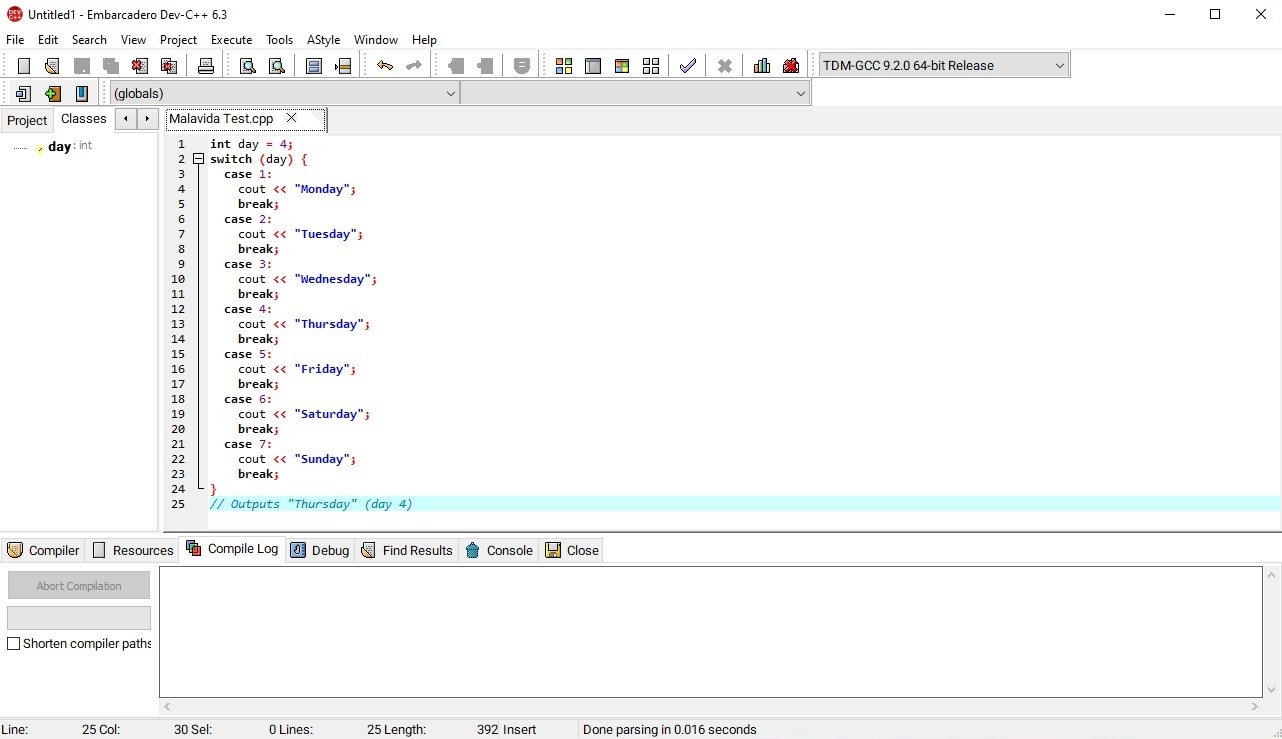OVERVIEW
- Download Dev C++ 4.9 9.2 Windows 10 Download
- Download Dev C 4.9 9.2 Windows 10 Download
- Download Dev C++ 4.9 9.2 Windows 10 1
- Download Dev C++ 4.9 9.2 Windows 10 64
Dev-C++ is a component rich IDE, which comes finish with compiler for making programming in C++. It is a fork of the first Bloodshed Dev-C++ condition.
Key Features include
- TDM-GCC 4.9.2 32/64bit.
- Sentence structure featuring.
- Code consummation.
- Code understanding.
- Editable easy routes.
- GPROF profiling.
- GDB investigating.
- AStyle code organizing.
- Devpak IDE augmentations.
- Outer devices.
Incorporated into the Dev-C++ condition are the majority of the standard highlights that are vital for composing, arranging, troubleshooting, and executing programs written in C. Dev-C++ has been intended for the in-your-face C++ developer as it enables you to make full scale of your source code without the straightforward highlights, which are normal with most programming conditions for amateurs.
Dev-C is a full-featured integrated development environment (IDE), which is able to create Windows or console-based C/C programs using the Mingw compiler system (version MSVCRT 2.95.2-1 included with this package), or the Cygwin compiler. It can also handle the Insight Debugger, which you can also download. Oct 30, 2018 Dev-C is an IDE that empowers its users to develop a project with as many source files integrated into it as they require. Writing options. This program gives many options to its users in terms of writing styles. The keywords and C elements can be highlighted while the user is writing on the project.
Dev-C++ underpins the accompanying dialects: Croatian, Romanian, Korean, French, Ukrainian, Dutch, Polish, Slovene, Latvian, Czech, Italian, Catalan, Greek, English, Portuguese, Slovak, Chinese (Traditional), Estonian, Galician, Bulgarian, Swedish, Turkish, Norwegian, Chinese (Simplified), Danish, German, Spanish, Russian, and Hungarian.
Generally speaking, Dev-C++ is awesome IDE to work with, on the off chance that you needn’t bother with any propelled devices. It has all the essential things that you require. In any case, in spite of the fact that it is a refreshed interpretation of a more seasoned IDE, despite everything it looks somewhat dated.

TECHNICAL SPECIFICATION & REQUIREMENT
- Title:DEV-C++ 5.11
- Filename:Dev-Cpp 5.11 TDM-GCC 4.9.2 Setup.exe
- File size:48.10MB (50,433,966 bytes)
- Requirements:Windows (All Versions)
- Languages:Multiple languages
- License:Open Source
- Date added:October 11, 2016
- Author:www.orwelldevcpp.blogspot.co.uk
- MD5 Checksum:581D2EC5EFF634A610705D01EC6DA553
CHANGELOG
- Settled crash identified with double tapping on a compiler blunder when a choice was made.
- Overhauled the default compiler to TDM-GCC 4.9.2.
- Enhanced startup speed.
- Settled Abort Compilation catch not working any longer.
- Settled crash in TCppParser.CheckForTypedefStruct.
- Settled crash in TCppParser.HandleEnum.
- Settled a few mistakes in the English interpretation (because of Hiro5).
- Refreshed the Catalan interpretation (because of Hiro5).
- Refreshed the Czech interpretation (because of tringi).
- Settled a few hiccups in the construct procedure of Dev-C++ itself.
How To Download & Install DEV-C++
Here you can download DEV C++ Free from below button.
How to Install Dev-C++ and the GLUT Libraries
for Compiling OpenGL Programs with ANSI C
(version of July 16, 2009)
These notes explain how to compile programs written in ANSI C with OpenGL and GLUT using the Dev-C++ compiler. https://luckyguide.netlify.app/antares-auto-tune-avox-evo-setupfiles.html.
Bloodshed Dev-C++ is a free C++ compiler and development environment for Windows operating systems. Like most C++ compilers, it also can be used to compile ANSI C. By installing the GLUT header and library files, it can be used to write programs that use OpenGL. This is needed to run programs for Edward Angel's textbook, Interactive Computer Graphics 5th edition and possibly other computer graphics texts.
These notes do not explain how to compile OpenGL with C++ . The 6th edition of Angel's book uses C++ which will not work with these notes.
These instructions have been tested on a small variety of Windows 2000 and Windows XP systems. These systems come with the files needed for OpenGL, but not the files needed for GLUT.
Dev-C++ does not work well with Microsoft's Vista. The problem, and a possible fix, is discussed here: http://aresio.blogspot.com/2007/06/vista-and-dev-cpp.html but I have not tested this information.
I. Download Dev-C++ from http://www.bloodshed.net/dev/devcpp.html and install it.
Details:
Get Dev-C++ 5.0 beta 9.2 (4.9.9.2) (9.0 MB) with Mingw/GCC 3.4.2 Although this is a 'beta' version, it works perfectly fine. Click on SourceForge to go to a list of download sites and pick one. The file will be something like devcpp4.9.9.2_setup.exe. Save this file in a place like C:Temp.
When the download is complete, click on the 'open' button to start the installation process. (Or go to C:Temp andDouble click on devcpp4.9.9.2_setup.exe). You will see a few screens that ask you to pick a language (English) and to agree to the license terms. Choose a 'typical' installation.
Accept the suggested destination for the installation:
Many subdirectories and files are extracted to the destintion:
Answer 'yes' when it asks if you wish to install Dev-cpp for all users. Note: if the installation fails, re-install and try 'no' for this.
A screen says the installation is complete:
Keep the check mark in the box. Click on 'Finish'. A first-time configuration screen appears:
Download Dev C++ 4.9 9.2 Windows 10 Download
Pick 'English' and 'New Look'. In the next several screens, hit 'Yes' for its suggestions.
Eventually you are done. Click 'OK'.
II. DEV-C++ starts up. Try out the installation with a simple C program.
Details:
The program starts up automatically.
Click File/New/Project. Pick a name for the project (such as 'myProject'). Click 'C Project'. Click on 'Empty Project'. Click 'OK'.
In 'Create New Project', click 'save' (later on you will probably want to create separate subdirectories for your various projects.).
Download Dev C 4.9 9.2 Windows 10 Download
Click 'File/New/Source File' and in 'Add source file to current project' click 'Yes'. You now get a screen where you can edit the source file.
Type in a simple C program, as below. Now click 'File/Save As' and save the file as 'hello.c' (or other name.) Important: be sure that the file extension is .c. With any other extension (such as the suggested .cpp) you will have problems compiling.
Now click 'Execute/Compile and Run'
The program will (hopefully) compile, run, and write its output to a DOS window. If you have the system('pause') statement in your program, the output will stay in the window until you hit a key. Another way to run the program (after it has been compiled) is to start a DOS window outside of the Dev-Cpp system, then navigate to the subdirectory that holds your project, and type hello.exe.
At this point, the compiler and development environment has been installed. You should find Dev-C++ listed under 'Programs' on the 'Start' menu and will now be able to write, compile, and run C (and C++) programs. You will have include files, libraries, and dll's for OpenGL (and all other standard packages) but not GLUT. GLUT manages the windows and other user interface components needed for OpenGL programming, and needs to be separately installed.
If you do not need GLUT , you can quit now.
III. Download and install GLUT
To run OpenGL with GLUT (which is what the programs in Angel's book use), you need to get three files and place each file in its proper directory. All the files you need (and more) are contained in one zip file.
Details:
Download GLUT files from http://chortle.ccsu.edu/Bloodshed/glutming.zip Download the file glutming.zip Save the zip file in some convenient location (perhaps C:temp).
Double click on glutming.zip (or otherwise unzip it). You will see the files that are in the zip archive. (Your un-zipping program will probably be diferent than the one shown here, but should work about the same.)
Click on 'Extract' to extract all the subdirectories and files. Pick some convenient directory to extract them to (perhaps C:tempglutming). You only need three files, but extract all of them anyway.
Only three of the files in the various subdirectories are needed. Each of the three files should be put in a subdirectory with other files of its type. Use Explorer to move the files to where they are needed.
Note: If you only see some of these files listed in Explorer, click on 'View/Options/View' and then select the radio button 'Show all Files'.
glut.h -- copy this file to C:Dev-CppincludeGL
Copy from your 'unzipped' subdirectories (wherever they are):
To here:

libglut32.a -- copy this file from your unzipped directories to C:Dev-Cpplib
There may be a newer version of this file there, already. Replace that version with the one you unzipped (if you keep the newer version your programs will not link correctly.)
Copy from your 'unzipped' subdirectories:
To here:
glut32.dll -- move this file to C:WINNTSystem32, or similar location.
The location for this file depends on your operating system. The directory where it goes is the directory that holds the dynamic load libraries (*.dll). An easy way to find where it should go is to look for glu32.dll (use 'Search' from the start menu).
The directory to use should also have the files glu32.dll and opengl32.dll. These should have come with your operating system.
IV. Test Dev-cpp with GLUT
The essential step in compiling and running a C program that contains OpenGL and GLUT functions is to tell the linker where the libraries are. This is done by clicking Project/Project Options/Parameters/Add Library or Options and then navigating to the libraries you need to include: libopengl32.a, libglu32.a, and libglut32.a. The libraries should be added in that order.
Details:
a. Create a subdirectory for a project. Do this first, before you start Dev-Cpp. Create a new subdirectory with 'Explorer' by clicking 'File/New/Folder'.
For example, create a folder C:GLproject.
b. Start Dev-cpp:
c. Start a new project by clicking File/New/Project. In the panel that pops up, name the project something like 'rectangle', click on 'empty project' and 'C': Click OK.
Note: For compiling with OpenGL you must create a project. You need to have a project (not just a single C file) in order to link in the OpenGL libraries.
d. In the next panel, navigate to your folder C:GLproject, and click 'Save'.
e. In Dev-C++, click 'File/New/Source File' and then in the next panel 'Add to Project' click 'yes'. Click 'File/Save As' and then give the file a name. Navigate to your project subdirectory to save the file in it. Name the file something like 'rectangle.c'
Be sure that the file names ends with '.c' anything else will cause big problems.
Auto tune evo tips free. f. Click and drag your mouse over the following program so that it is highlighted, then click 'Edit/Copy' from the browser's menu bar.
g. Now click in the editing window of Dev-cpp and then click 'Edit/Paste' in its menu bar. The program will appear in the editing window.
h. Click 'File/Save'. The file in your project directory should now contain an OpenGL program.
i. Tell Dev-cpp what libraries need to be linked. Click 'Project/Project Options'.
j. Now click 'Parameters'. Click the 'Add Library or Object' button and navigate to the libraries that should be added, found under C:Dev-cpplib
- ./lib/libopengl32.a
- ./lib/libglu32.a
- ./lib/libglut32.a
Add them in that order (only). Notice that the slashes will appear in Unix style '/' rather than DOS-style '.
Download Dev C++ 4.9 9.2 Windows 10 1
When you are done adding the three libaries, you should see:
The exact pattern of '././.' you see depends on how deep in the directory structure your source file lies.
Click 'OK'.
k. Click 'Execute/Compile and Run'. The program should compile, link, and run:
Download Dev C++ 4.9 9.2 Windows 10 64
If things don't work (very common) click on the 'Compile Log' tab for some confusing error messages. If you see something like the following, it means that you made a mistake in adding the libraries to the project:
Download sstream for dev c++. Try to fix the list of libraries, or perhaps start over from scratch.
You now are finished, or have given up.